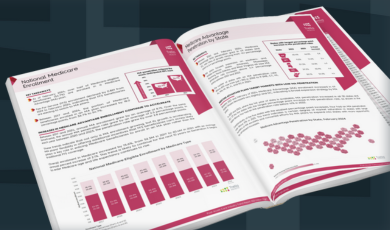EmmaKate Few, Business Development Rep
A member of Trella's Business Development team, EmmaKate enjoys employing the same energy, game planning, and consistency from her athletic background into the competitive yet rewarding world of healthcare analytics. From reporting from the XFL sidelines as the Dallas Renegades digital host to studio hosting as the Weekend Sports Anchor for KTAL in Shreveport, Louisiana, her passion for sports and public speaking has taken her across the globe. She is a 2020 Magna Cum Laude graduate of Southern Methodist University with degrees in Journalism, Applied Physiology and Sport Management, and Religious Studies. While at SMU, EmmaKate was a member of the Women's Cross Country team, was the ESPN Campus Correspondent, a published researcher for the NFL office in London, and one of the key faces of Mustangs football and basketball as the gameday emcee and host of the Live PonyUp Pregame Show.Moneyball for Healthcare: Data is the Key
By EmmaKate Few | August 16, 2021
In a highly competitive world, winning requires unconventional thinking.
Consider professional sports – MLB scouts understand that finding the right players to add to their roster means looking beyond the surface. And healthcare professionals, especially those participating in value-based care models, have to do the same.
Data is the Unsung Hero
Billy Beane, General Manager of the Oakland A’s, knew that the road to his team’s success would require divergence from old-school traditions. When tasked with evaluating players using a limited budget, Beane and his staff leaned on the tangible evidence that only data could provide. A winning season wasn’t the responsibility of one star athlete. If a player’s record indicated that he could get on base, that was their ticket to long-term success.
How Can Healthcare Learn from Baseball?
If data analytics can lead to a highly improbable yet very real 20-game winning streak for the 2002 A’s, imagine the long-term growth impacts it can have for your DCE or ACO.
Meeting CMS benchmarks and cutting unnecessary healthcare costs are a lot like getting on base. Just as the A’s managed risk by using data to predict a player’s performance, ACOs and DCEs can use a physician’s performance data to evaluate whether they would help their network succeed.
But things change quickly in healthcare – especially for alternative payment models. When rules, regulations, and deadlines change, it’s time to shift your mindset. If you can’t win the game, change it.
Data was the game-changer for Billy Beane and the A’s. But ACOs and DCEs have always relied on data to build their networks – what can they do to improve recruitment and impact outcomes? Their game-changer is a better, more detailed type of data: physician-level claims alignment.
Whether you are a DCE looking to identify high-value physicians who aren’t currently participating in a CMS ACO or simply looking for some transparency into what is available in your market, numbers don’t lie.
“The idea that I [should] trust my eyes more than the stats, I don’t buy that because I’ve seen magicians pull rabbits out of hats, and I know that the rabbit’s not in there.” – Billy Beane
Focusing on Metrics that Matter
Only through statistics were Beane and the Oakland A’s able to cut costs and build out a high-caliber roster filled with untapped baseball talent. If one of the oldest institutions in America can move away from antiquated evaluation tactics and start leveraging unequivocal statistics and data to build stronger, more skilled rosters, so can you.
A successful value-based care contract is only as strong as the network that delivers the care. Trella’s ACO and DCE customers maximize growth and meet benchmarks by recruiting top-performing physicians whose risks are measurable.
Learn More
Trella has focused on building out physician-specific metrics that no other analytics solution can provide. Our metrics are risk-adjusted and standardized to provide an accurate comparison of different potential physicians in your area that can boost your network.
So, to quote a pivotal character in baseball history, “I think the question I should be asking is: Do you believe in this thing, or not?”
If you’re not quite sure, check out Moneyball to see the virtues of unconventional network building and request your demo of Marketscape Strategy from Trella Health.













